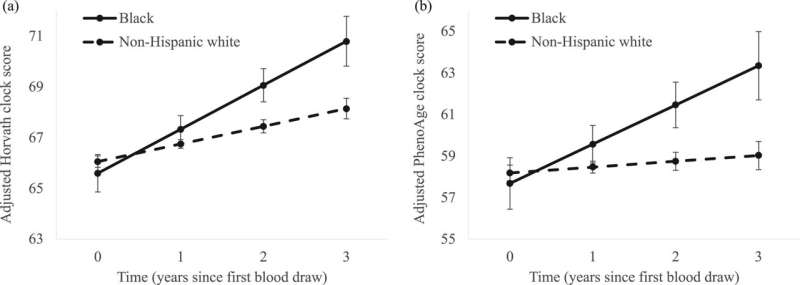This article has been reviewed according to Science X's editorial process and policies. Editors have highlighted the following attributes while ensuring the content's credibility:
fact-checked
peer-reviewed publication
trusted source
proofread
Novel research shows older breast cancer survivors experience accelerated aging, worse functional outcomes

In a new multi-center study, researchers from the Medical College of Wisconsin (MCW) joined with leading cancer centers from across the nation to examine whether cancer and its treatments accelerate aging.
Using novel epigenetic measures to assess biological aging, investigators found that older breast cancer survivors—particularly those exposed to chemotherapy—showed greater epigenetic aging than their same-aged peers without cancer, which may relate to worse outcomes. These findings were recently published in the journal Cancer.
Epigenetic aging provides a method for measuring the underlying aging process and may be a useful clinical tool in identifying cancer survivors at greater risk for poor outcomes and quality of life (QOL). Leveraging data from the Thinking and Living with Cancer (TLC) (NCT03451383) cohort, researchers assessed participants' biological aging at two timepoints between 24 and 60 months after study enrollment. Study participants were between 62 and 84 years old; most survivors had early-stage breast cancer and about one-third (32.6%) had received chemotherapy.
Results revealed that survivors were biologically older than controls at 24 months or more after enrollment and these differences persisted as long as 60 months. Additionally, survivors who received chemotherapy showed the largest differences, and among this group, women with an older epigenetic age reported worse cognitive function.
"These findings can help inform future research that examines whether biological aging markers may be useful clinical tools to identify cancer survivors at increased risk for worse outcomes and to intervene to prevent or slow functional declines and improve QOL following cancer treatment," said Kelly Rentscher, Ph.D., assistant professor in the Department of Psychiatry and Behavioral Medicine at MCW and first author of the study.
"Our results indicate that cancer treatment exposure, and in particular chemotherapy, is associated with more aging at the biological level, providing support to the concept that some cancer treatments may accelerate aging," said study senior co-author Judith Carroll, Ph.D., director of the Aging Biology and Behavior Laboratory at UCLA's Norman Cousins Center for Psychoneuroimmunology.
"Differences in underlying biological age and ability to withstand the rigors of cancer therapy are not always clinically obvious and can vary widely even at the same chronological age, suggesting that measures like epigenetic age might provide a useful component of care and geriatric assessments," said study senior co-author Jeanne Mandelblatt, MD, MPH, director of the Institute for Cancer and Aging at Georgetown University's Lombardi Comprehensive Cancer Center and professor of oncology at Georgetown University School of Medicine.
More information: Kelly E. Rentscher et al, Epigenetic aging in older breast cancer survivors and non‐cancer controls: preliminary findings from the Thinking and Living with Cancer (TLC) Study, Cancer (2023). DOI: 10.1002/cncr.34818




















